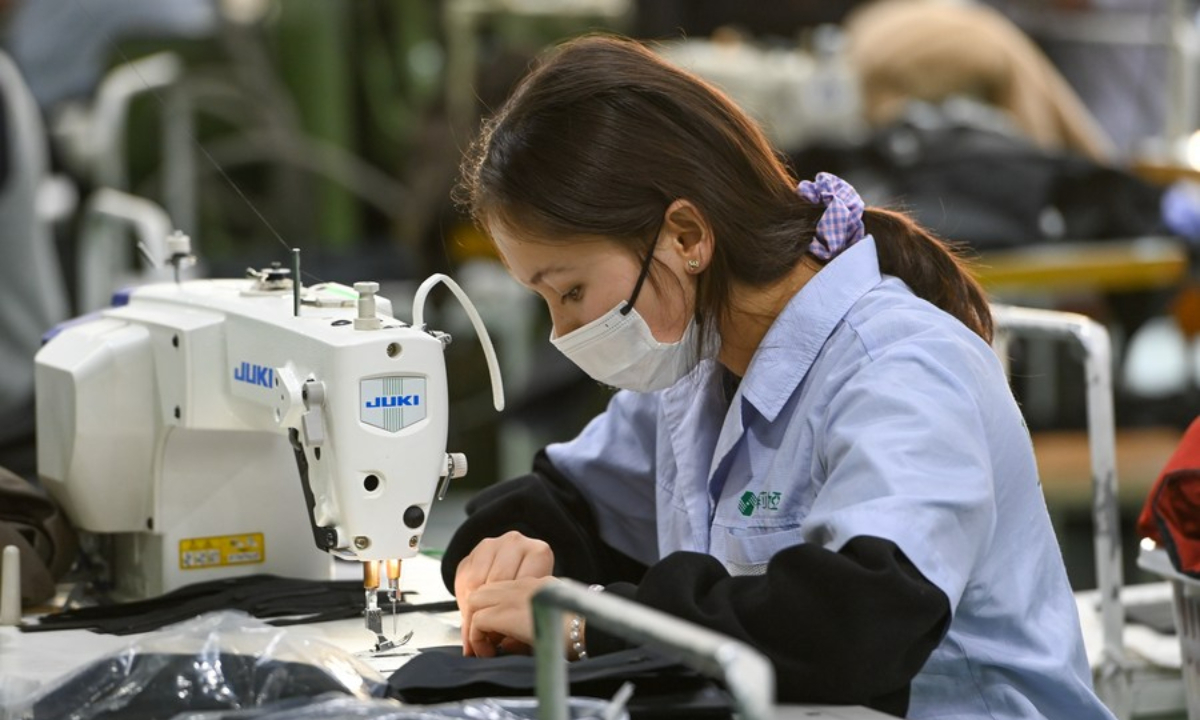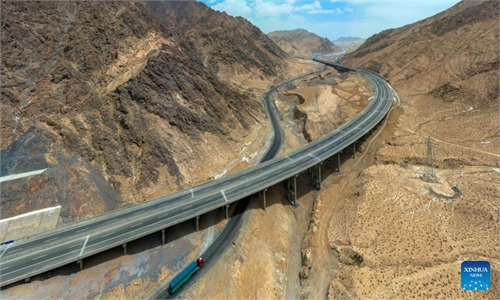EU's reported plan to ban ‘forced labor’ products shows discrimination, hegemony, experts say
Move likely exacerbates EU economic woes, disrupt global supply chain

A staff member works in a clothing factory at the integrated industrial park in Moyu County of Hotan, northwest China's Xinjiang Uygur Autonomous Region, Jan 11, 2022. Photo:Xinhua
The EU is reportedly planning to further ban products made in Xinjiang on the fake accusation of "forced labor", an action which Chinese media interpreted as the bloc's intention to restrict products made in China's Xinjiang Uygur Autonomous Region.
While the move will further shadow China-EU relations after the EU blindly followed the US on many international issues, it will also exacerbate the current economic troubles faced by many European countries, as well as disrupt global supply chains, experts said.
According to a report by the Financial Times on Sunday, the EU is planning to ban products made using "forced labor", such as shoes, clothes, timber and cocoa.
The report cited a "confidential draft paper" as showing the ban is likely to become law in 2023 at the earliest, and will apply to products where the so-called "forced labor" is used at any stage of production, harvest or extraction.
Although the newspaper does not mention any specific countries that could be targeted, some Western media has associated the ban with products made in China's Xinjiang, as the US-led West are spreading rumors that "forced labor" is used in Xinjiang for making products like cotton and other goods.
"It looks like the EU is protecting human rights, but as a matter of fact, the US-led West are just spreading their ideological values," Bai Wenxi, chief economist of IPG China, told the Global Times.
Li Yong, deputy chairman of the Expert Committee of the China Association of International Trade, said for the EU, the ostensible reason to follow the US' heels, trying to reduce its dependence on China.
"But in fact, the West does not recognize and does not want to see China's rise and success, which means that there are other models besides the western model that can make countries develop and prosper," Li told the Global Times on Monday.
At the same time, the move also reflects the deep-rooted racial discrimination and prejudice of the West, Li noted.
The Biden administration signed into law an act in December that prohibits products from being imported into the US that are produced in Xinjiang, unless the importer can prove that the goods are not produced with "forced labor".
Chinese officials have repeatedly refuted the accusations of "forced labor" in Xinjiang. Zhao Lijian, a spokesperson of China's Foreign Ministry, said in June that the "forced labor" accusation is a "staggering lie" propagated by the US to contain China.
Experts noted that the West's move to exclude products made in Xinjiang will not only add to Europe's severe economic woes, but will also result in more disruptions in global supply chains.
"It will push the EU' elevated inflation even higher, increase European people's living costs, and adding a further burden to Europe's economic operations," Bai said.
Inflation in eurozone surged 9.1 percent from a year ago in August, data from the EU's statistics agency revealed. The rise marked the ninth straight month of consumer price increases for the bloc. Excluding Xinjiang products will trigger ripple effects on global supply chains and commodity prices, as Xinjiang has an important position in the global supply chains.
An article published by He Min, an associate professor under the China Foreign Affairs University, showed that Xinjiang's production industries like cotton, tomato sauce, polycrystalline silicon and wind turbines have an important role in global markets.
For example, the region's production of polycrystalline silicon accounts for more than half of the world's total output, while the region produces about one fifth of the world's cotton.
The global price of cotton has risen significantly in recent months, which experts partly attributed to West' ban on Xinjiang cotton.
Experts also said that the trade ban will also impact global solar panel supply chains, as Xinjiang is an important production base of photovoltaic modules.
"The US' determination to suppress China's photovoltaic industry revealed its anxiety over losing dominant position in the new-energy sector. While the US wants to wean itself off China, it also wants to revitalize its domestic photovoltaic industry," said Li.
Since the Xinjiang region produces about 40 percent of China's photovoltaic products, targeting Xinjiang is the same as targeting China's photovoltaic industry, or the new-energy industry, Li added.
In the face of the EU's move to target Xinjiang products, Bai said it's important to actively communicate with the EU to seek to resolve the misunderstandings. He suggested that China expand cooperation with European countries to resist the US' containment of the Chinese economy.


